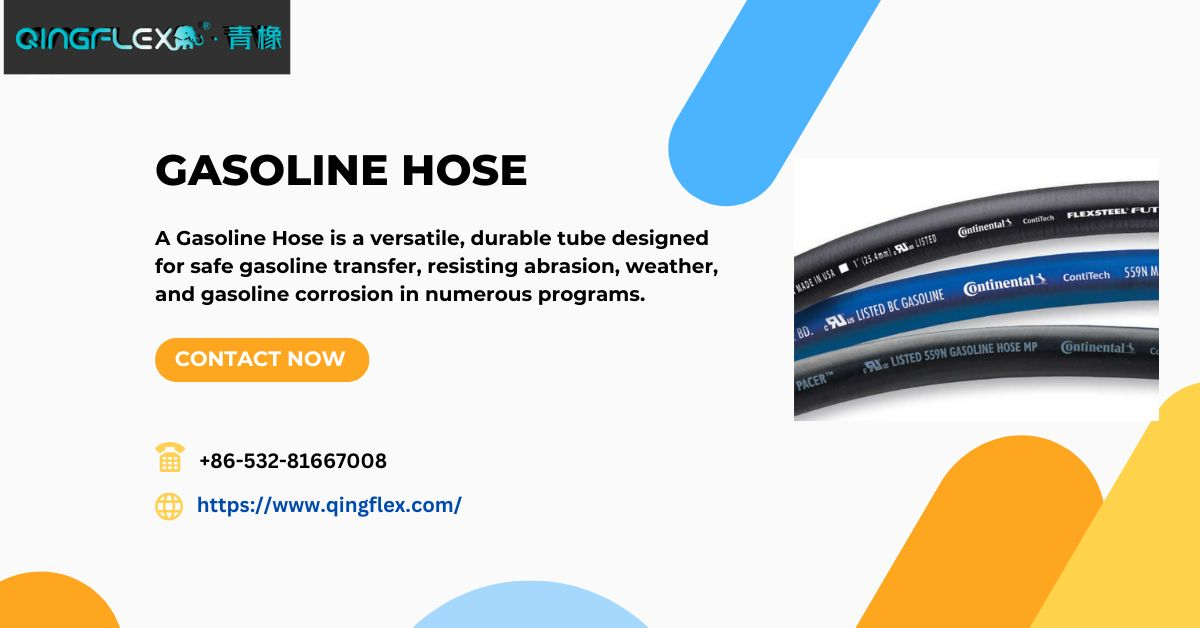Products
- Wrapped Cover Wire Spiral Hydraulic Hose (27)
- wrapped & smooth braided hyraulic hose (43)
- Acid Frac Hose (4)
- Oilfield Drilling Hose (35)
- Floating Hose (123)
- Industrial Hose (49)
- Fiber Braided Hose (30)
- Hydraulic Fitting (224)
- Hose Assembly (2)
- Liquid Cooling Hose (3)
- Concrete Pumping Hose (2)
- Ultra High Pressure Thermoplastic Hose (8)
- Hydraulic Adapter (283)
News
Reliable Fuel Transfer Solutions with Durable Gasoline Hose
In the fuel industry, efficiency and safety are crucial elements of any operation involving the transfer of Gasoline Hose and other petroleum-based products. A gasoline hose plays a vital role in ensuring the safe and smooth flow of fuel from one point to another. Whether used at gas stations, in transportation systems, or for industrial applications, these hoses are specifically designed to handle the unique demands of fuel transfer, offering resistance to corrosion, pressure, and harsh environmental conditions. Choosing the right gasoline hose ensures reliability, safety, and long-term performance in a wide range of fuel-handling operations.
Understanding the Role of Gasoline Hoses
A gasoline hose is a flexible conduit engineered to convey fuel efficiently while preventing leaks, contamination, or vapor emissions. It serves as a critical component in refueling systems, connecting fuel tanks to dispensers, engines, or storage containers. The construction of a gasoline hose involves multiple layers designed to withstand pressure, prevent permeation, and resist chemical reactions with hydrocarbons. These hoses are commonly used in fuel stations, refineries, garages, and other industrial environments where the controlled transfer of gasoline and other fuels is required.
The durability of a gasoline hose depends largely on its construction and materials. Most hoses feature a synthetic rubber inner tube that is resistant to gasoline, diesel, ethanol blends, and other petroleum derivatives. Reinforcement layers made from braided or spiral steel wire or synthetic fiber provide added strength and flexibility, allowing the hose to maintain its shape under high pressure. The outer cover is typically made of abrasion-resistant and weatherproof rubber that protects against external damage from sunlight, ozone, and mechanical wear. The design ensures safety, reliability, and longevity even in demanding working environments.
Applications of Gasoline Hoses
Gasoline hoses are used in a variety of sectors where fuel transfer is a regular requirement. In the automotive industry, they are essential for delivering fuel to engines and machinery. At fuel stations, these hoses are used for dispensing gasoline and diesel to vehicles, ensuring consistent flow and preventing leaks. Industrial operations, including chemical plants and refineries, rely on heavy-duty hoses to transport fuels safely between tanks, pipelines, and equipment. Portable fuel transfer systems, agricultural machinery, and marine applications also utilize gasoline hoses for efficient and secure fuel handling. Their versatility and strength make them indispensable in both commercial and domestic use.
To ensure optimal performance, gasoline hoses are manufactured in compliance with international safety standards such as SAE, ISO, and EN regulations. These standards define the hose’s resistance to pressure, temperature, and chemical exposure. A high-quality gasoline hose must be capable of maintaining flexibility in both high and low temperatures, resisting kinks, and preventing static buildup. Safety features like anti-static wire integration help dissipate electrical charges that could otherwise cause ignition. By adhering to these standards, manufacturers guarantee that the hoses perform safely and effectively under various operational conditions.
Regular maintenance is essential to maximize the service life of gasoline hoses and maintain safe operations. Hoses should be inspected periodically for signs of wear, cracking, or soft spots that could indicate material degradation. Cleaning the hose after use helps prevent contamination and buildup that might affect fuel purity. Proper storage in a cool, dry place away from direct sunlight extends its lifespan and prevents the rubber from hardening or cracking. Timely replacement of worn-out hoses ensures uninterrupted performance and prevents potential hazards such as leaks or ruptures during operation.
Innovations in Gasoline Hose Technology
Advancements in hose manufacturing technology have led to the development of products that are lighter, more flexible, and more resistant to harsh conditions. Modern gasoline hoses often incorporate multi-layer composite materials that combine superior fuel resistance with improved thermal stability. Anti-permeation technology reduces the release of fuel vapors, contributing to environmental safety. Some models are designed with transparent or semi-transparent layers to allow visual inspection of fuel flow. Quick-connect fittings and reinforced couplings make installation easier and reduce downtime in maintenance operations. These innovations enhance both safety and efficiency across all stages of fuel transfer.
Why Quality Matters in Gasoline Hoses
Using high-quality gasoline hoses is essential for maintaining operational safety and efficiency. Inferior hoses may not withstand prolonged exposure to fuels, resulting in leaks, cracking, or contamination. A reliable hose minimizes maintenance costs, reduces the risk of environmental damage, and ensures consistent fuel delivery. For industries where downtime can be costly, investing in durable hoses designed by reputable manufacturers provides peace of mind and long-term value. Selecting the right hose for the specific application ensures better performance and compliance with safety standards.
Conclusion
Gasoline hoses are an indispensable part of fuel handling systems, offering a secure and efficient way to transfer gasoline and other petroleum products. Their robust construction, chemical resistance, and flexibility make them suitable for a variety of industrial and commercial applications. With advancements in material technology and adherence to international safety standards, modern gasoline hoses deliver enhanced durability, reliability, and performance. By choosing quality hoses and maintaining them properly, businesses can ensure safe, smooth, and efficient fuel transfer operations, contributing to overall productivity and environmental safety.




